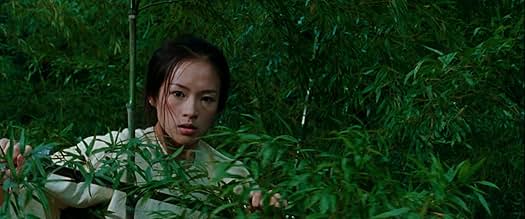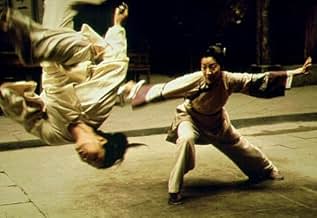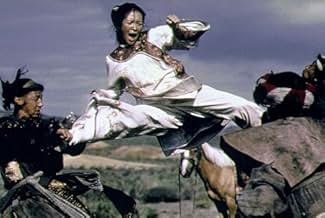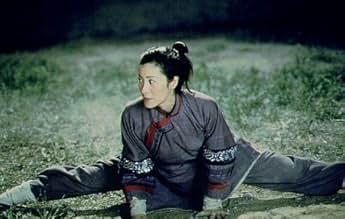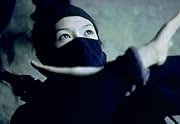In una terra di infinita bellezza e di leggende, una spada antichissima e preziosa fa incrociare i destini di un guerriero, della donna che lo ama, di un fuorilegge e di una principessa dest... Leggi tuttoIn una terra di infinita bellezza e di leggende, una spada antichissima e preziosa fa incrociare i destini di un guerriero, della donna che lo ama, di un fuorilegge e di una principessa destinata a diventare un guerriero.In una terra di infinita bellezza e di leggende, una spada antichissima e preziosa fa incrociare i destini di un guerriero, della donna che lo ama, di un fuorilegge e di una principessa destinata a diventare un guerriero.
- Regia
- Sceneggiatura
- Star
- Vincitore di 4 Oscar
- 101 vittorie e 132 candidature totali
Chow Yun-Fat
- Master Li Mu Bai
- (as Chow Yun Fat)
Ziyi Zhang
- Jen
- (as Zhang Ziyi)
Pei-Pei Cheng
- Jade Fox
- (as Cheng Pei-Pei)
Deming Wang
- Tsai
- (as Wang De Ming)
Suying Huang
- Auntie Wu
- (as Huang Su Ying)
Jinting Zhang
- De Lu
- (as Zhang Jin Ting)
Jianhua Feng
- Gou Jun Sinung
- (as Feng Jian Hua)
Zhenxi Du
- Shop Owner
- (as Du Zhen Xi)
Cheng Lin Xu
- Captain
- (as Xu Cheng Lin)
Recensioni in evidenza
Fans burnt by George Lucas' "Phantom Menace" found solace in Ang Lee's cosily straightforward "Crouching Tiger Hidden Dragon". The film was greeted with a shrug in China (it was a flop), a country desensitised to wuxia tales, but Westerners loved it. Probably because "Tiger" is basically "Star Wars", with its own assortment of bounty-hunters, Jedis, Sith Lords, princesses, rogues, warriors, villains, henchmen, Yodas, fairy tale romances, teachers, masters, apprentices, chosen ones and much vague talk of destiny, fate and "light" and "dark" sides. When he's not indulging in super choreographed action sequences, Lee's aesthetic is also very Lucasy, which is to say, very John Ford, very David Lean, very Kurosawa, with clean lines, big open spaces, and simple but careful shot selection. What's strange is the film's budget. The film looks like it has the budget of one of those big, state backed Chinese or Stalinist productions, but "Crouching" was made for about fifteen million dollars. Lee gets a lot of mileage out of his budget.
Martial arts fans abhor "Tiger". It's too geared to western tastes, too watered down, and China's been churning out similar wuxia for decades. Why should this one get all the credit? But Lee does put his own spin on the material. His film is more sensual, poetic, graceful, romantic, has a mysterious beauty, and is more delicate than is typical of the genre. His female characters are also given a bigger role than is customary and his action at times seems more like expressive dance.
Repression, restrictions, strict moral codes and self-control are an obsession with Lee. With "Hulk" we had a scientist who struggles to curb his anger, his "Taking Woodstock", "Wedding Banquet" and "Brokeback Mountain" revolved around characters repressing their homosexuality, while "Sense and Sensibility", "Lust Caution", "Ice Storm" and "Woodstock" again all hinged on either repression, free expression or the inhibiting of desire. In "Crouching's" case – the title itself refers to "one who has hidden, suppressed talents" - we have a stifled three-way love between characters called Mu Bai, Shu Lien and Jen Yu, all of whom are prohibited from desire by strict moral/social codes, feudal customs and warrior traditions.
The rejection of these codes is perhaps why the film was shunned by China (and is so popular with western women). Chinese mythology, Taoist philosophy and the hokey "mysticism" of Asian martian arts films (akin to "Star Wars'" "The Force"), all stress an esoteric mode of detachment, a form of denial characteristic of Eastern thought in which the world is seen to be illusory and detached cogitation is seen to be the path to enlightenment. Lee, in contrast, is trading in a more genteel, Western sensibility; a kind of romantic humanism where one is called to ditch Eastern stoicism and embrace the "reality" and "meaning" of human attachments in this life. This tug-of-war is epitomised by a trio of conversations located in each of the film's three acts. In the first, characters called Mu Bai and Shu Lien, who we learn have long had feelings for each another but have denied these feelings to pursue the demands of a Wudan warrior lifestyle, discuss the fact that Mu Bai, when meditating, reaches not "the bliss of enlightenment" but "a place of endless sorrow". For Mu Bai, passions cannot be extinguished and only serve to increase the pull of desire. Mu Bai's conflict – the way clinging to personal affection is contrary to his Wudan ways of detachment – can be found even in Lucas' "Star Wars" prequels, only there Lucas has some monastic ninja kid literally moan about the way his calling prevents him from losing his virginity ("Me want make sexy time but Yoda say no! Wah Wah Wah!").
The second conversation occurs at the film's midpoint, when Mu Bai and Shu Lien finally touch. "Shu Lien," he recoils, "the things we touch have no permanence. My master would say there is nothing we can hold onto in this world. Only by letting go can we truly possess what is real." Shu Lien then brushes aside his Taoism with direct, naive realism: "Not everything is an illusion. My hand is real."
It's in the third conversation that the film breaks away from your typical martial arts movie mysticism and repudiates Wudan philosophy. Here, Mu Bai is dying and Shu Lien urges him to meditate: "Free yourself of this world. Let your soul rise to eternity. Do not waste your breath on me." "I have already wasted my life," Mu Bai responds. "I would rather be a ghost drifting by your side, as a condemned soul, than enter heaven without you." Contrast this with the countless marital arts movies, or even the "Star Wars" franchise, which end with the ghostly spirits of dead warriors, monks and masters hovering contently over the living. Mu Bai is given no supernatural reprieve, no higher plane of existence. He just dies. The film then ends with the recounting of a mountain legend in which a young woman must paradoxically "float away and never return" if she wishes to "return". The whole film hinges on a similar paradox: acting on a desire one desires not to have. It's the paradox of Buddhism: continually desiring to eliminate desire, whereby satiating desire is impossible and it is ultimately desire which blocks the road to desirelessness. This is contrasted with a more Western hedonism, where the hedonist attempts the cessation of desire by "giving in" to them all.
Beyond all this, the film resembles the works of King Hu, Ozu and Ichikawa, the latter two only insofar as it contrasts straitjacketed older generations, and their societal obligations, with oppositional, younger generations. The film's ending suggests that a character called Jen sacrifices her life/love so that Mu Bai and Shu Lien may finally be together.
8.5/10 – Worth two viewings.
Martial arts fans abhor "Tiger". It's too geared to western tastes, too watered down, and China's been churning out similar wuxia for decades. Why should this one get all the credit? But Lee does put his own spin on the material. His film is more sensual, poetic, graceful, romantic, has a mysterious beauty, and is more delicate than is typical of the genre. His female characters are also given a bigger role than is customary and his action at times seems more like expressive dance.
Repression, restrictions, strict moral codes and self-control are an obsession with Lee. With "Hulk" we had a scientist who struggles to curb his anger, his "Taking Woodstock", "Wedding Banquet" and "Brokeback Mountain" revolved around characters repressing their homosexuality, while "Sense and Sensibility", "Lust Caution", "Ice Storm" and "Woodstock" again all hinged on either repression, free expression or the inhibiting of desire. In "Crouching's" case – the title itself refers to "one who has hidden, suppressed talents" - we have a stifled three-way love between characters called Mu Bai, Shu Lien and Jen Yu, all of whom are prohibited from desire by strict moral/social codes, feudal customs and warrior traditions.
The rejection of these codes is perhaps why the film was shunned by China (and is so popular with western women). Chinese mythology, Taoist philosophy and the hokey "mysticism" of Asian martian arts films (akin to "Star Wars'" "The Force"), all stress an esoteric mode of detachment, a form of denial characteristic of Eastern thought in which the world is seen to be illusory and detached cogitation is seen to be the path to enlightenment. Lee, in contrast, is trading in a more genteel, Western sensibility; a kind of romantic humanism where one is called to ditch Eastern stoicism and embrace the "reality" and "meaning" of human attachments in this life. This tug-of-war is epitomised by a trio of conversations located in each of the film's three acts. In the first, characters called Mu Bai and Shu Lien, who we learn have long had feelings for each another but have denied these feelings to pursue the demands of a Wudan warrior lifestyle, discuss the fact that Mu Bai, when meditating, reaches not "the bliss of enlightenment" but "a place of endless sorrow". For Mu Bai, passions cannot be extinguished and only serve to increase the pull of desire. Mu Bai's conflict – the way clinging to personal affection is contrary to his Wudan ways of detachment – can be found even in Lucas' "Star Wars" prequels, only there Lucas has some monastic ninja kid literally moan about the way his calling prevents him from losing his virginity ("Me want make sexy time but Yoda say no! Wah Wah Wah!").
The second conversation occurs at the film's midpoint, when Mu Bai and Shu Lien finally touch. "Shu Lien," he recoils, "the things we touch have no permanence. My master would say there is nothing we can hold onto in this world. Only by letting go can we truly possess what is real." Shu Lien then brushes aside his Taoism with direct, naive realism: "Not everything is an illusion. My hand is real."
It's in the third conversation that the film breaks away from your typical martial arts movie mysticism and repudiates Wudan philosophy. Here, Mu Bai is dying and Shu Lien urges him to meditate: "Free yourself of this world. Let your soul rise to eternity. Do not waste your breath on me." "I have already wasted my life," Mu Bai responds. "I would rather be a ghost drifting by your side, as a condemned soul, than enter heaven without you." Contrast this with the countless marital arts movies, or even the "Star Wars" franchise, which end with the ghostly spirits of dead warriors, monks and masters hovering contently over the living. Mu Bai is given no supernatural reprieve, no higher plane of existence. He just dies. The film then ends with the recounting of a mountain legend in which a young woman must paradoxically "float away and never return" if she wishes to "return". The whole film hinges on a similar paradox: acting on a desire one desires not to have. It's the paradox of Buddhism: continually desiring to eliminate desire, whereby satiating desire is impossible and it is ultimately desire which blocks the road to desirelessness. This is contrasted with a more Western hedonism, where the hedonist attempts the cessation of desire by "giving in" to them all.
Beyond all this, the film resembles the works of King Hu, Ozu and Ichikawa, the latter two only insofar as it contrasts straitjacketed older generations, and their societal obligations, with oppositional, younger generations. The film's ending suggests that a character called Jen sacrifices her life/love so that Mu Bai and Shu Lien may finally be together.
8.5/10 – Worth two viewings.
Less than half an hour into the viewing of this masterpiece I knew this would become one of my favorite films - of all time. Only in my wildest dreams (quite literally, this movie has touched me on a personal level) have I visualized such fantastic and precise choreography, so captivating that to take your eyes away during the intense confrontations is to deny yourself the essence of what makes this film so wonderful.
With an artistic license unprecedented, the action scenes are entirely unbelievable but purely the work of a fabulous imagination. The magical settings and the colorful characters fit well into the plot but you will take away the breath-taking martial arts sequences.
With an artistic license unprecedented, the action scenes are entirely unbelievable but purely the work of a fabulous imagination. The magical settings and the colorful characters fit well into the plot but you will take away the breath-taking martial arts sequences.
As a film student living in Toronto, I look forward to the Toronto International Film Festival every year. Last year, the highlight of the festival for me was American Beauty. This year, it would have to be (so far) Ang Lee's "Crouching Tiger, Hidden Dragon".
Being of Asian descent, I've seen my share of wu xia genre movies to last me a life time. However, most of them are so centred on the fighting, that they forget the rest of the elements that are involed. The movie turns into one long scripted fighting scene with maybe a slight hint of story. Crouching Tiger, on the other hand realizes these issues, and builds these oh-so entertaining action sequences into an epic with typical asian themes such as true love and honour.
Being an epic, one would expect the usual long takes and establishing shots, and boy does it ever look beautiful. Traversing through a myriad of regions spanning the lengh of China (from the deserts to bamboo forests, to mountains high in the clouds), the film soley based on its asthetic properties is nothing short of stunning. The lighting of different landscapes and the exquisitly designed costumes all radiate with stunning colour. And then there's the cinemetography. Wow! The backdrops, establishing shots look absolutely marvelous. If your jaw dropped when you saw Rome and its coliseum in Gladiator, wait until you see ancient Beijing recreated on the screen!
Okay, so it's a good looking movie. What about the story? The complexity of the plot is rather sparse, probably reminiscent of epics such as Braveheart or Gladiator, which is by no means a bad thing. Although both Chow Yun Fat and Michelle Yeo did have major parts, this movie belongs mostly to Zhang Ziyi who IMHO did an amazing job playing a very complex role (one which required her to represent nobily as a princess, naivness, as well as show inner strength). Mainly concentrating on her unwillingness to give in to the ideals of an arranged marriage, the decently written script adds a story of an old warrior trying to retire and a 300+ year old sword.
All in all, this film blends story, well choreographed action, and a stylistic eye to create a mythilogical piece that not only represents the wu xia genre justly by doing it well, but also contributes to raising the quality of filmmaking usually applied in the making of a similar type of film.
Being of Asian descent, I've seen my share of wu xia genre movies to last me a life time. However, most of them are so centred on the fighting, that they forget the rest of the elements that are involed. The movie turns into one long scripted fighting scene with maybe a slight hint of story. Crouching Tiger, on the other hand realizes these issues, and builds these oh-so entertaining action sequences into an epic with typical asian themes such as true love and honour.
Being an epic, one would expect the usual long takes and establishing shots, and boy does it ever look beautiful. Traversing through a myriad of regions spanning the lengh of China (from the deserts to bamboo forests, to mountains high in the clouds), the film soley based on its asthetic properties is nothing short of stunning. The lighting of different landscapes and the exquisitly designed costumes all radiate with stunning colour. And then there's the cinemetography. Wow! The backdrops, establishing shots look absolutely marvelous. If your jaw dropped when you saw Rome and its coliseum in Gladiator, wait until you see ancient Beijing recreated on the screen!
Okay, so it's a good looking movie. What about the story? The complexity of the plot is rather sparse, probably reminiscent of epics such as Braveheart or Gladiator, which is by no means a bad thing. Although both Chow Yun Fat and Michelle Yeo did have major parts, this movie belongs mostly to Zhang Ziyi who IMHO did an amazing job playing a very complex role (one which required her to represent nobily as a princess, naivness, as well as show inner strength). Mainly concentrating on her unwillingness to give in to the ideals of an arranged marriage, the decently written script adds a story of an old warrior trying to retire and a 300+ year old sword.
All in all, this film blends story, well choreographed action, and a stylistic eye to create a mythilogical piece that not only represents the wu xia genre justly by doing it well, but also contributes to raising the quality of filmmaking usually applied in the making of a similar type of film.
As Ang Lee, I grew up reading wuxia novels in Taiwan. Those novels usually mixed engrossing history, thrilling action, enchanting romance. But when these novels were made into movies or TV series, none of them could match my imagination. It's either because of wrong casting, bad acting, tedious costumes, sloppy storytelling, minimal budget (so everything is shot in studio rather than in the grand Chinese landscapes as they were told in books), fake action... I could go on and on. Now Ang Lee finally made a wuxia film that captures my imagination and fulfills my dream of childhood.
The casting of CTHD is perfect. No disrespect to Jet Li, but Jet Li would not make Li Mu Bai into what he should be: noble, wise but weary. Chow Yun Fat conveys the unspoken feelings of Li Mu Bai in a way I can't imagine anyone else can. But he's known for his acting, Michelle Yeoh was known for her fighting skills. Here in CTHD, she proves herself as an excellent dramatic actress. The secrete longing for Li and the confusion of Li's true feelings were clearly conveyed by her eyes. The scenes between them are heartbreaking. Zhang Zi Yi is a true discovery! What a wonderful talent to steal scenes after scenes from the veterans around her. She ran from looking innocent, haughty, feisty to loving and distraught. She made the complex Jen a real flesh and blood believable human being. Chang Chen made a perfectly sexy and charming bandit.
The scenery and the photography was beyond belief. The majestic landscapes of China match my imagination when I read all the beautiful Chinese poems of the Tang and Sung dynasties. No wonder those poets could come up with those masterpieces. They sure had the best inspiration. Peter Pau not only captured the landscapes and the settings, he also managed to capture the fast-as-lightening action wonderfully. The shot of Jen gliding over water just lodged in my mind. The soundtrack is also excellent. Tan Dun used different instruments to match the different locales. He mixed in Central Asian music in the desert sequence and Chinese flute in the Southern China scenes. Yo-yo Ma's cello in the main theme makes me want to weep everytime I hear it.
The storytelling was also done expertly. As a romantic-at-heart, I love the desert romance between Jen and Lo. It's one of the most charming and believable love stories that I can remember. Most people gave credit of the fighting to Yuen Wo Ping. I'd give kudos to Ang Lee. I've seen Yuen's martial art films before, but they're never done in such an imaginative and artistic way. The artistic vision has to come from Ang Lee.
To sum it up, three cheers for Ang Lee! You not only fulfilled your childhood dream, you fulfilled mine too. It's such a pleasure to finally see a wuxia novel be done right. Thank you! Thank you! Thank you!
The casting of CTHD is perfect. No disrespect to Jet Li, but Jet Li would not make Li Mu Bai into what he should be: noble, wise but weary. Chow Yun Fat conveys the unspoken feelings of Li Mu Bai in a way I can't imagine anyone else can. But he's known for his acting, Michelle Yeoh was known for her fighting skills. Here in CTHD, she proves herself as an excellent dramatic actress. The secrete longing for Li and the confusion of Li's true feelings were clearly conveyed by her eyes. The scenes between them are heartbreaking. Zhang Zi Yi is a true discovery! What a wonderful talent to steal scenes after scenes from the veterans around her. She ran from looking innocent, haughty, feisty to loving and distraught. She made the complex Jen a real flesh and blood believable human being. Chang Chen made a perfectly sexy and charming bandit.
The scenery and the photography was beyond belief. The majestic landscapes of China match my imagination when I read all the beautiful Chinese poems of the Tang and Sung dynasties. No wonder those poets could come up with those masterpieces. They sure had the best inspiration. Peter Pau not only captured the landscapes and the settings, he also managed to capture the fast-as-lightening action wonderfully. The shot of Jen gliding over water just lodged in my mind. The soundtrack is also excellent. Tan Dun used different instruments to match the different locales. He mixed in Central Asian music in the desert sequence and Chinese flute in the Southern China scenes. Yo-yo Ma's cello in the main theme makes me want to weep everytime I hear it.
The storytelling was also done expertly. As a romantic-at-heart, I love the desert romance between Jen and Lo. It's one of the most charming and believable love stories that I can remember. Most people gave credit of the fighting to Yuen Wo Ping. I'd give kudos to Ang Lee. I've seen Yuen's martial art films before, but they're never done in such an imaginative and artistic way. The artistic vision has to come from Ang Lee.
To sum it up, three cheers for Ang Lee! You not only fulfilled your childhood dream, you fulfilled mine too. It's such a pleasure to finally see a wuxia novel be done right. Thank you! Thank you! Thank you!
I just saw this film today. I was totally captivated... when it was all over, and the credits began to run, it took me a couple of seconds to realize where I was. I didn't want to get out of my seat. And once I got out of the theatre, I couldn't even talk about it for an hour or so. I kept running the details over and over in my head. It's rare that a film has such an impact on me. The cinematography was stunning. The special effects were beautifully done. The characters' moves were effortless. The acting was wonderful. I really think that Michelle Yeoh should have been nominated for an Oscar for Best Actress. I thought that the effects and storyline complimented each other brilliantly. There were so many different layers to the plot. There were many things that couldn't be explained with dialogue that were expressed in the characters' faces. This film had lighthearted moments, heartwrenching moments, romantic interludes, inspirational sentiments, wonderful plot twists, superb acting, beautifully done fight scenes, never before seen special effects...it had it all. Some scenes may have been a little over the top, but it's *fantasy*... and yet, after a few brief moments, it somehow became completely believable. That's how much this film draws you in. This is a one of a kind film; there is just no comparing it to any other. It transports you to another place and time. I highly recommend it.
Lo sapevi?
- QuizMichelle Yeoh deliberately did not work for a year before filming began so she could concentrate on training and learning Mandarin.
- Blooper(at around 1h 30 mins) During the fight between Yu Shu Lien and Xiou Long, many floor tiles are smashed by Shu Lien. After Shu Lien discards her heavy metal weapon and continues to fight, the tiles appear intact.
- Curiosità sui creditiThe opening title appears in Chinese and English.
- Versioni alternativeAn English dubbed version was created for the home video market.
- Colonne sonoreA Love Before Time
Music Composed by Jorge Calandrelli, Dun Tan
Lyrics by James Schamus, Elaine Chow (Translation)
Performed by Coco Lee featuring Cello Solo by Yo-Yo Ma
Coco Lee appears courtesy of Sony Music Entertainment (Holland) B.V.
I più visti
Accedi per valutare e creare un elenco di titoli salvati per ottenere consigli personalizzati
- How long is Crouching Tiger, Hidden Dragon?Powered by Alexa
- Is 'Crouching Tiger, Hidden Dragon' based on a book?
- What is "crouching tiger, hidden dragon" supposed to mean?
- What is "wuxia"?
Dettagli
- Data di uscita
- Paesi di origine
- Sito ufficiale
- Lingue
- Celebre anche come
- El tigre y el dragón
- Luoghi delle riprese
- Aziende produttrici
- Vedi altri crediti dell’azienda su IMDbPro
Botteghino
- Budget
- 17.000.000 USD (previsto)
- Lordo Stati Uniti e Canada
- 128.530.421 USD
- Fine settimana di apertura Stati Uniti e Canada
- 663.205 USD
- 10 dic 2000
- Lordo in tutto il mondo
- 213.978.518 USD
- Tempo di esecuzione2 ore
- Colore
- Mix di suoni
- Proporzioni
- 2.39 : 1
Contribuisci a questa pagina
Suggerisci una modifica o aggiungi i contenuti mancanti


